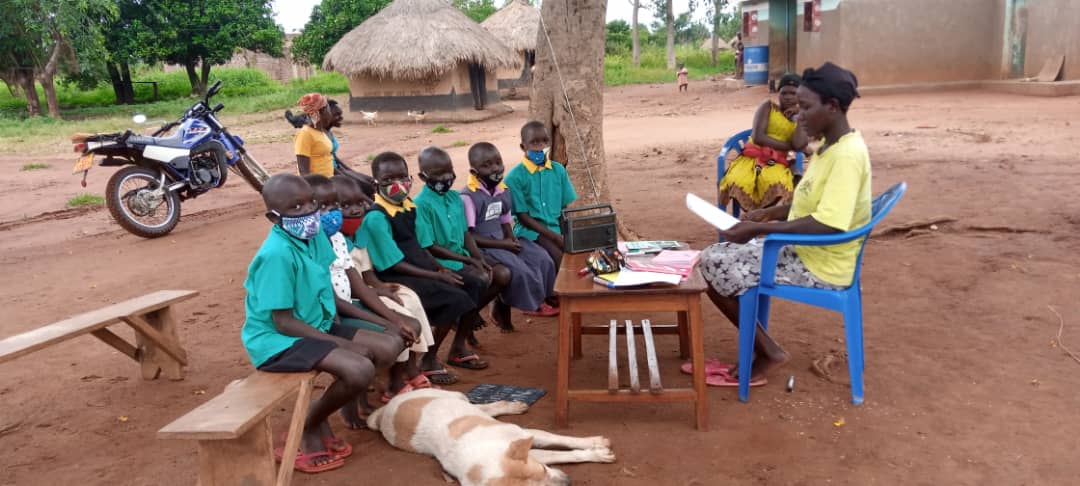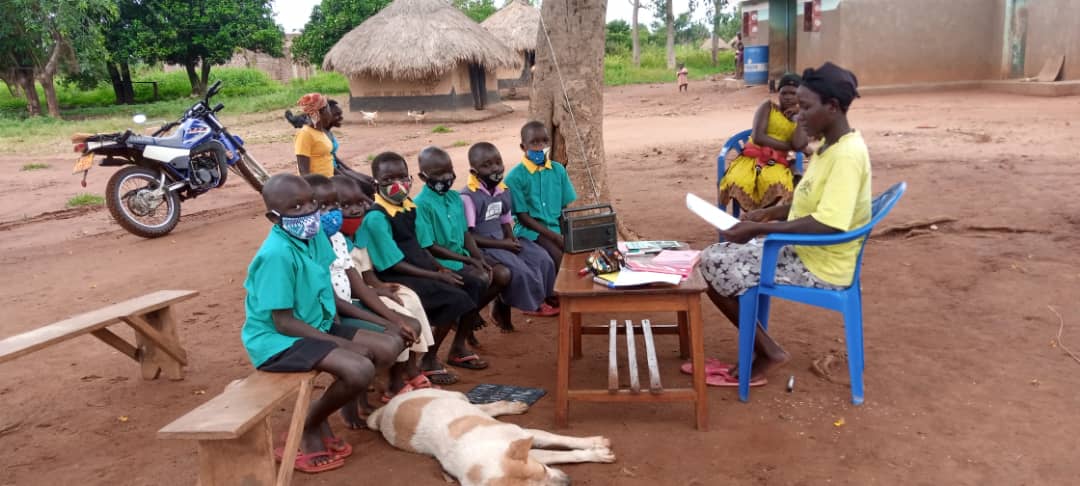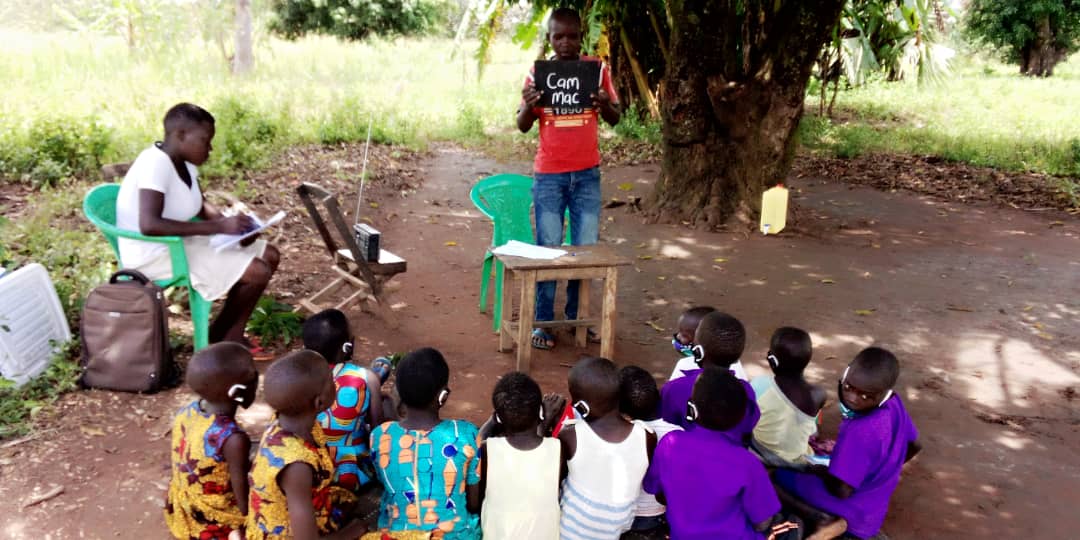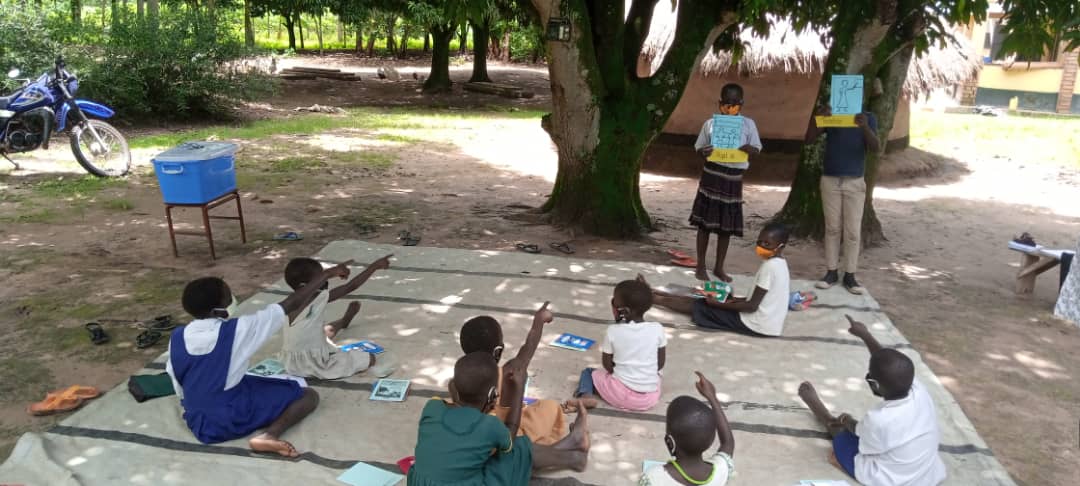An invested non-profit and old-school innovation join forces to educate and uplift a community in crisis

Sometimes innovation is not about the shiny new things, but rather about grasping existing opportunities to make them work for you and your community, especially when confronted with a crisis.
In April 2020, faced with the COVID-19 pandemic and subsequent school closures, Mango Tree Literacy Lab (MTLL), based in Lira, Uganda, went old school with their innovation, approaching a local radio station to ask for airtime, with the idea of teaching early literacy over the airways.
While online learning solutions were being put in place by many schools, it was immediately apparent that this wouldn’t work for the numerous rural schools in the global South, which have limited or no access to the internet, no readily available connected devices and unreliable energy resources. MTLL director, Craig Esbeck acknowledged in a recent report he wrote for The Early Literacy Resource Network, that ‘it will be many years before the schools we work with have access to the internet or have the capacity to meaningfully engage with technology to download books and instructional materials that they can use in the classroom’.

Caption: P1 learners attending their radio-based classroom, faciliated by a co-teacher 'translating' the oral instructions into a visual lesson.
For this blog series, the Early Learning Resource Network is reaching out to authors, editors, illustrators, translators, educators, publishers and other stakeholders who, through their creative endeavours, are working to grow and improve the early learning environment, specifically on the African continent. The focus is on pertinent issues such as access to books and stories, open licensing, innovative publishing, literacy challenges, language-use and translation.
I spoke to Jimmy Mwoce and JB Opeto, teachers and community liaisons who have been with MTLL for almost a decade, about how the MTLL radio project started in 2020, how it has evolved, and what they are hoping to do next.
How it started
When schools closed, MTLL spontaneously approached their local radio station, QFM, with a ‘humble’ request for a 15-minute time slot – they were given 60 minutes on a Saturday. And so for the first few weeks, they put together an impromptu educational radio show targeted at P1 primary school pupils.
JB explains that putting an educational radio show on the air is nothing new; the government has been doing it for years, but the social infrastructure that MTLL built around the radio show is what makes it different, and what makes it work.
In addition to obtaining the radio slot and partnering with the global non-profit research group, EdTech Hub, MTLL decided to focus on answering this question through their work: What is the most fit-for-purpose model for radio instruction for out-of-school children? Ultimately, all this led to the development of their current show, Our Learning Time, which is an hour-long, scheduled slot, with robust school, community and local government support, broadcasting every Saturday starting at midday.
The format of the radio show and roles and responsibilities
Jimmy and JB are both involved with scripting the radio show, which has four segments. Jimmy writes the reading and writing segment and the storytelling segment. JB writes the English lesson segment. Together they work on the final segment that emphasises games and activities the listeners can play at home, to provide them with an opportunity to practice the competencies learned in the lesson. They format each lesson as a template-based script, which they record weekly on their mobile phones, and deliver via USB stick to the radio station for broadcast on a Saturday.
While the broadcast is taking place, they visit their communities to get on-the-ground feedback, which includes input from the learners and their parents, the co-teachers, learning centre co-ordinators, and community representatives.

Caption: Jimmy explains that this is where he gets his inspiration from, ‘seeing learners able to follow my instruction through the medium of radio’.
So who and what makes up the social infrastructure?
Six weeks into their project, both Jimmy and JB were frustrated by the fact that there was no feedback loop within their radio ‘classroom.’ They were essentially teaching into a void. Simple things like teaching P1 children letter formation became a huge challenge, as it’s nearly impossible to describe writing without visual support. When funding became available through EdTech Hub, they were able to quickly devise and implement a social infrastructure to support their radio program.
Fortunately, MTLL has an excellent relationship with the schools and local government in the Lango region that it has developed over the years. It had also, up until that point, been facilitating a mentorship programme with teachers in the community. So representatives from all these constituencies were onboarded. The teachers were tasked with setting up listening centres in the villages. As listening centre coordinators, they organized a communal radio per centre from a willing volunteer, provided batteries, and recruited up to ten learners for each centre. Health workers were asked to set up sanitizing stations and to advise on COVID-19 protocols, while the village leaders rallied their communities to support the initiative.
Finally, and most critically in my opinion, co-teachers were trained to ‘translate’ the radio lessons into visuals that the P1 learners could follow and to manage the learning process in each of the centres. These co-teachers range from ex-teachers, to current teachers, to parents and, incredibly, even primary pupils, some as young as P3 and P4. Primary pupils make particularly good co-teachers as they’ve been through the government’s Leblango curriculum and have been taught the fairly new orthography – they are able to read and write the language – while many adults are only able to speak it.
As an added bonus, the young co-teachers are developing leadership skills and getting the opportunity to practise their own language skills.

Caption: Listening centres are limited to 10 pupils, who are given instruction via the radio programme and a co-teacher who faciliates the lesson.
Supplementary materials
The Saturday observations of the listening centres and additional focus groups that Jimmy and JB have set up have proved valuable in understanding how the P1 learners are receiving the lessons and how the co-teachers are serving as proxies for them. According to JB, the learners are now arriving for their lessons an hour before the radio show begins and hanging out for an hour afterwards – their parents are almost as enthusiastic and often attend the lesson as well.
The co-teachers are given a Co-teacher Guidebook that the Listening Centre Coordinator uses to prepare them for the Saturday radio show. Recently, the co-teachers also requested a copy of the stories that are read aloud so they can get familiar with the story ahead of time and plan their own questions and activities. The level of involvement from the co-teachers is heartening, and clearly the passion Jimmy and JB are able to embed within their radio lesson is echoed on the ground.
Borrowing from previous MTLL projects, the parents are given a copy of the Parent Literacy Guidebook, which was designed by MTLL to complement the Leblango curriculum, and allows for the child’s learning to continue at home. The Guidebook that the parents receive is written in Leblango, but there is an openly licensed English version on the MTLL website, which readers can use and translate to other languages without requesting permission.
Jimmy and JB are looking forward to hosting a focus group with the parents, to get their feedback and to offer some guidance on how to use the Parent Literacy Guidebook. As Jimmy describes it, ‘we are partners working together, and this way everyone becomes responsible for the children’s education’.
A clear indication of the success of the project so far is eager parents asking for instruction in other school subjects. JB explains that if the parents had their way, the MTLL team would be offering mathematics as well.
What’s next?
Unfortunately, funding for the project is limited and the pair broadcast their final lesson in December 2020. Jimmy would like to see the work they’ve done used elsewhere. He feels that publishing these materials and their research findings under an open licence will be helpful for others experiencing the same challenges. ‘It’s not a good idea to be selfish with knowledge and ideas, once you’ve tested something and seen that it works, why not share it, and allow it to be modified for language and culture?’ If they can source additional funding, Jimmy and JB hope to continue the radio project, and increase its scope.
During the EdTech Hub pilot, they were working with five schools in four districts. Each school identified five listening centres, resulting in a total of 100 listening centres and over 1000 listeners. Having witnessed the impact their pilot has had, Jimmy is keen to continue. As he explains:
JB agrees. He values local language learning and believes if children are taught first in the language they understand best, it will help them to think, and to do well, with everything else they are learning. To view or use the books produced by MTLL – in both English and Leblango, please take a look at the Level 1 books here, and the Level 2 books here.




